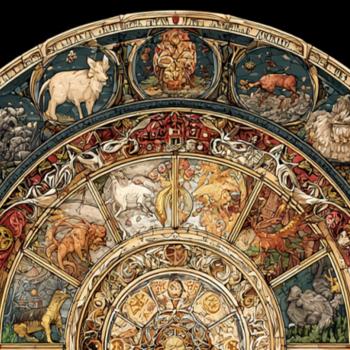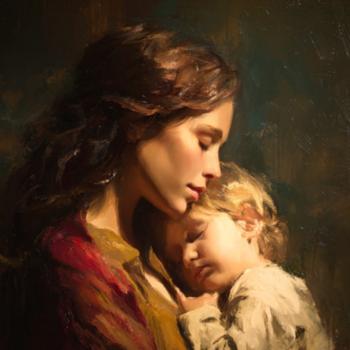
I’ll be honest, I’m a pessimist at heart. There’s a phrase I love that says “The definition of a Pessimist is: An Optimist with experience.”
That’s my basic posture.
But, as I’ve been doing research for my next book, I ran across a beautiful description of the early Christians that really took my breath away and made me reconsider my pessimistic tendencies.
In the book, “Universalism: The Prevailing Doctrine of the Christian Church During Its First Five Hundred Years” by J.W. Hanson, there’s a quote from another book [“Universalism Asserted”], which says:
“The church was born into a world whose moral rottenness few have – or can have – any idea. Even the sober historians of the later Roman Empire have their pages tainted with scenes impossible to translate: Lusts the foulest, debauchery to us happily inconceivable, raged on every side. [And so] to assert even faintly the final redemption of all this rottenness, whose depths we dare not try to sound, required the firmest faith in the larger hope, as an essential part of the Gospel. But this is not all; in a peculiar sense the church was militant in the early centuries. It ws engaged in, at times, a struggle for life or death, with a relentless persecution. Thus it must have seen in that age almost an act of treason to the cross to teach that, though dying unrepentant, the bitter persecutor, or the votary of abominable lusts, should yet in the ages to come find salvation.”
He goes on to note:
“The early fathers wrote when the wild beasts of the arena tore alike the innocent and the guilty, limb from limb, amid the applause even of gently-nurtured women…they wrote when every minister of justice was a torturer…when every household of the better class – even among Christians – swarmed with slaves liable to torture, to scourging, to mutilation, at the caprice of a master or the frown of a mistress. Let all these facts be fully weighed, and a conviction arises irresistibly, that, in such an age, no idea of Universalism could have originated unless inspired from above.”
His point here is that the concept of universal redemption was not something taught by the Old Covenant scriptures, nor was it taught by the Pagan religions surrounding them, or is it something that resides in the heart of man naturally – the idea that the most evil and hateful among us should receive the beautiful mercy of Christ. And yet…
And yet this teaching WAS found in many, many of the ancient Christian’s writings. So, he [Hanson] asks:
“Where, then, did they find it? [This extravagant mercy] Whence did they import this idea? Can we doubt that the fathers could only have drawn it, as their writings testify, from the Bible itself?”
Now, in addition to this radical idea of universal reconciliation, the author also points out another inspirational feature of the early Church: Their invincible joy and optimism.
As the book points out:
“The first Christians regarded the grave as the doorway into a better world, and expressed only hope and trust in their emblems and inscriptions.”
Specifically, as evidenced by several hundred years worth of inscriptions found in the catacombs, the author notes that their views about life in Christ were most clearly exemplified in the ways they spoke about death; at a time when they should have been most sorrowful and negative; and yet what we see instead of a focus on darkness and suffering and loss is an almost uni-vocal testimony to an unfathomable cheerfulness.
As he notes:
“The fathers of the church live in their voluminous works; [but] the lower orders [common Christians] are only represented by these simple records [found in the catacombs], from which, with scarcely an exception, sorrow and complaint are banished; the boast of suffering, or an appeal to the less revengeful passions is nowhere to be found. One expresses faith, another hope, a third charity. The genius of primitive Christianity – to believe, to love and to suffer – has never been better illustrated…in all the pictures and scriptures of our Lord’s history, no reference is ever found to his sufferings or death. No gloomy subjects occur in the cycle of Christian art.“
And another scholar quoted agrees, saying:
“To the early Christians, Christ was living; the one agonized hour [on the cross] was lost in the thought of his glory and triumph. The fall of theology and Christian thought dates from the error of dwelling upon his death instead of his life.” [Ruskin]
And speaking of these earliest Christians, New Testament scholar Farrar adds:
“It was a religion of joy and not of gloom, of life and not death, of tenderness and not severity.”
As I read these words, I began to grieve over what the Christian church has become today. I began to long for us to return to those infant years where we were delighted by the life of Christ and easily cheered by mere association with Him. It made me recall the words of our Lord when He said:
“Unless you become like little children, you will not enter the Kingdom of God.” [Matt. 18:3]
Maybe we need to go back as a Church and once again discover the simple joys of knowing Christ. Maybe we need to abandon our fears of tomorrow, and our arguments about theology; maybe we need to remember what it was like to delight ourselves in the sweetness and goodness of God.
It makes me wonder: What if Christianity were more like this today? What if, whenever anyone thought of Christianity, they couldn’t help but picture a people who personified child-like humility? What if we were known for our unshakable love? What if the words “Joy” and “Life” were more synonymous with those who identify as Christians?
I can’t help but think that these are the same questions that are – even know – ringing in the ears of Our Lord and beating in time with His own heart for us.
I long for a more optimistic, happy and joyful Church. I’m so tired of the fear-mongering; the judging; the tribalism, and the division.
Aren’t you? Aren’t you ready for a brand new form of Christianity that is full of life and hope? Aren’t you eager to embrace a Christianity that reflects the joyful face of Jesus to the world?
We already have so much darkness. More than enough anger. Way too much fear.
Bring on the joy. Let loose the love. Throw open the doors of hope.
It’s time the Christian Church came out of the darkness and into the light once more.
Don’t you think?
**
Keith Giles was formerly a licensed and ordained minister who walked away from organized church 11 years ago, to start a home fellowship that gave away 100% of the offering to the poor in the community. Today, He and his wife live in Meridian, Idaho, awaiting their next adventure.
His new book “Jesus Unbound: Liberating the Word of God from the Bible”, is available now on Amazon and features a Foreword by author Brian Zahnd.
He is also the author of the Amazon best-seller, “Jesus Untangled: Crucifying Our Politics To Pledge Allegiance To The Lamb” with a Foreword by Greg Boyd.
Keith also co-hosts the Heretic Happy Hour Podcast on iTunes and Podbean.
BONUS: Want to unlock exclusive content including blog articles, short stories, music, podcasts, videos and more? Visit my Patreon page.













